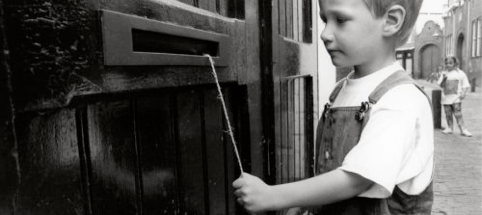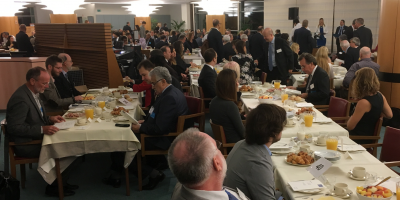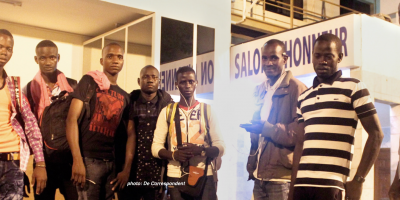Last Thursday evening was a wake-up moment on Dutch television. Social media reports went viral and journalists scrambled on every side to respond. On a popular live prime-time talk show with millions watching, former politician Jan Terlouw (85) hit a deep nerve nation-wide as he compared today’s society with that of fifty years ago.
‘There are no more cords hanging out of the letter boxes,’ he said, lamenting the loss of trust in Dutch society. He was referring to an age-old practice enabling children to pull the front door latch open with the cord dangling through the slit in the front door.
We don’t trust each other any more, he continued. One entrepreneur told him that deals he used to close with a hand-shake now needed five contracts. Another contractor complained that to build a bridge he now needed more lawyers than engineers.
Why did American voters choose for Trump, he asked, despite a campaign offending women, Mexicans, Muslims and many others, and denying what scientists have known for decades about global warming? Because, he offered, the voters recognised that the other party was also not to be trusted, with their secret deals for Wall Street.
The same with Brexit, Terlouw continued. Politicians and experts had warned the public not to vote ‘leave’. But the citizens’ message was: ‘we don’t trust you’.
“But politicians can only solve things together with the people in a trust society,” he told his studio audience. “If trust is so low, then that is a very great problem. How can we solve that? I’d like to say to all politicians: show integrity, be trustworthy, and demonstrate that you want to serve the public interest, the concern for the future, for the youth, for a sustainable earth… for a society where the cords hang out of the letter boxes.”
Barriers
Also on Thursday, Cambridge scientist Stephen Hawking expressed his own deep concern for the same lack of trust in society in The Guardian newspaper, and for the growing barriers between nations. Recognising that he belonged to the elite whose advice was rejected by much of the public, he made a heart-felt plea that now, more than at any time in our history, our species needed to work together.
“We face awesome environmental challenges: climate change, food production, overpopulation, the decimation of other species, epidemic disease, acidification of the oceans. Together, they are a reminder that we are at the most dangerous moment in the development of humanity. We now have the technology to destroy the planet on which we live. We need to break down, not build up, barriers within and between nations.”
That same day, I was myself in London attending an event addressing ‘the crisis of liberty in the West’. Among the world-renowned speakers were Sir Roger Scruton and Professor Rémi Brague. While several contributors helpfully identified the loss of spiritual foundations at the root of this crisis, I found myself returning to Holland that evening with a deep sense of unease. Concern to restore liberty seemed to be confined to one’s own country, while little attention had been given to how the nations should and could partner together in promotion of freedom. How could the trust relationship be restored between nations?
Sir Roger’s celebration of British nationhood and sovereignty raised serious questions for me. It may seem fine and benign for the Farages and the Trumps to say ‘let’s make Britain/America great again!’, but the view from outside is not reassuring. What if every nation took that attitude? Look at Putin: “Let’s make Russia great again!” Imagine if Angela Merkel’s successor over a few years was a far-right AfDer, and began trumpeting: “Let’s make Germany great again!” Or Le Pen in France… Doesn’t that sound like 100 years ago all over again?
Symposium
This is the very scenario Robert Schuman hoped to make permanently obsolete in his efforts to create a European community of sorts. He stressed the need for trust, partnership and interdependence. He envisioned a community of peoples deeply rooted in the Christian values of equality, freedom, solidarity and peace. He warned that such a project needed a soul and could not just be economic and technological. With Konrad Adenauer, he promoted forgiveness and reconciliation as the foundation for such trust and commitment.
What is so tragic about today’s headlines is that populist voices, too often supported by those calling themselves Christians, are busy dismantling the foundations painstakingly laid after the war for a framework of trust and cooperation.
This is an urgent issue.
Tomorrow in Brussels, at the second Schuman Symposium on Spirituality and Politics in the Chapel of Europe, we will be reminded of the crucial need of spiritual values to guide us through these politically challenging times.
Open borders reflect trust. They are the cords hanging out of the national letter boxes.
Till next week,




Having also read Justin Welby, Archbishop of Canterbury’s speech last week on ‘shared values’ it sounds as if our only hope is the God who rescues us and gives us a hope and future in Christ Jesus.